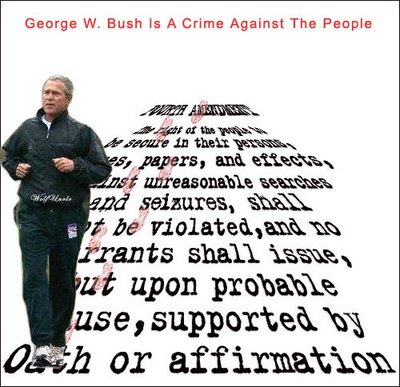Frightening News: Public Ignorance Quotient Skyrockets

On the issue of domestic spying--compiling an enormous database of every phone call made domestically, irrespective of any actual connection with terrorist activity)--the Washington Post has reported that "a majority of Americans initially support a controversial National Security Agency program to collect information on telephone calls made in the United States in an effort to identify and investigate potential terrorist threats, according to a Washington Post-ABC News poll.
"The new survey found that 63 percent of Americans said they found the NSA program to be an acceptable way to investigate terrorism, including 44 percent who strongly endorsed the effort. Another 35 percent said the program was unacceptable, which included 24 percent who strongly objected to it."
Demon Princess takes some comfort in the fact that responses to polls have a great deal to do with how the pollsters frame their questions. Maybe these were framed without pointing out that the point of the database was not necessarily tracking terrorists, but a revival of the really scary (long ago discredited & supposedly abandoned) "Total Information Awareness" program. (If you don't need to be convinced of the veracity of what I'm saying here, go click on the title bar to register your concern with your Congressional reps right now.)
I quote an editorial in a Chicago paper whose conservative columnist reminds us what that was all about:
"At first blush this program carries troubling echoes of Total Information Awareness, a proposed Defense Department 'data-mining' expedition into a mass of personal information on individuals' driver's licenses, passports, credit card purchases, car rentals, medical prescriptions, banking transactions and more. That was curbed by Congress after a public outcry. It seems the people who wanted to bring you TIA didn't get the message."
Or maybe they didn't ask, "Doesn't it bug you even a bit that we've been told officially, over & over again, that the only Americans being monitored are those who have overseas connections (bad enough, in my opinion), and the only reason this new information has come out on such a scale is that a newspaper (USA Today) chose to dig deeper? Into those reports of suits brought by the ACLU & the Electronic Freedom Foundation which have apparently been flying under the general public's radar. Hell, people, the signs have been there all along--it's just taken several newspapers to connect the dots. The fact that the Bush Administration does all it can to quash our "free press" when its no longer behaving like a complacent lapdog seems also to be a bit of irrelevant info to most people.
American public, pay attention, lest history prove you really were too distracted, docile or just plain stupid to govern yourselves & the great American experiment in democratic government collapses in the flames of self-absorption, narcissism & preoccupied consumerism. If George & Hayden have their way, we certainly won't be a "free country" anymore.
What I'm really ticked off about here is that I'm hearing deliberate attempts by the defenders of these programs to give the impression that the Fourth Amendment permits their activities, by citing old decisions which are only half the story, or saying that phone companies have gotten your permission to do this to you in their fine print. Which is, in any event, a private contract, not a Constitutional matter. People, the Constitution overrides any private contract with a service provider, & these companies pay their corporate counsels to know that.
But none of them, with the exception of Qwest, challenged the requests to invade your privacy with not even the weak semblance of protection that a FISA order provides. Nobody in this Administration even bothers with that. General Hayden doesn't have the foggiest idea what is required to obtain a warrant under the Fourth Amendment. And that's why I'm so exercised about the whole thing.

Anyway. The 911 card gets played again.
For Americans' general edification, or those who weren't paying attention in Civics class, (or weren't even forced to take it) here's a recap of why it matters. As the Chicago dude reminded us, we, as a country, have been here before.
From MSNBC: Fred Kaplan, a privacy advocate, explains why Americans should care about the NSA's database of phone records.
"We have hit the point where paranoia is a proper frame of mind for assessing nearly everything this administration says or does.
"The moment arrived Thursday, when USA Today revealed that the National Security Agency has been secretly collecting the phone records of tens of millions of Americans, with the aim of creating "a database of every call ever made," to people not only abroad but also within our borders.
"This goes well beyond the scope of the NSA domestic-surveillance program revealed last year by the New York Times. President George W. Bush responded to that story by emphasizing that, under the terms of the program, 'one end of the communication must be outside the United States.' That assurance turns out to have been highly deceptive, if not an outright lie.
"The NSA program, even such an expansive one, might be a good idea. As described by USA Today, it does not involve monitoring or recording the content of all these phone calls (an activity that no agency would have the time to do anyway). Rather, officials describe it as 'data mining,' for the purpose of 'social network analysis.
"Let's say X is suspected of planning terrorist activities. It might be useful to know who's been talking with X and who's been talking with those people. The feds wouldn't just want to take down X. They'd want to take down his whole network. By the time they discover what X is up to, it might be too late to monitor his future calls; so they'd want to know about his past calls. They can't guess, ahead of time, who those people might be—hence the idea of creating a comprehensive database.
"Again, this isn't necessarily a bad idea. But here's the crucial issue: The executive branch of the government cannot be trusted with sole access to such massive and intrusive information. This has nothing to do with who the president is; it has everything to do with the nature of power. To dispute this fact is to dispute the need for checks and balances; it's to dismiss the constitutional premise of the U.S. government.
"All this was widely recognized back in the 1970s, when Congress passed the Foreign Intelligence Surveillance Act and created the FISA court—whose records would be secret and permanently sealed—to enforce it.
"The issues back then were similar to the issues today. (For a fuller history of what follows, click here.) In 1967, the Supreme Court ruled in Katz v. the United States that Fourth Amendment protections apply to wiretaps—except when national security is involved. Nothing in the law in question, it ruled, 'shall limit the constitutional powers of the President to take such measures as he deems necessary to … obtain foreign intelligence information deemed essential to the security of the United States.'
"However, in 1972, the court noted in The United States v. U.S. District Court that the Katz ruling 'implicitly recognizes that the broad and unsuspected governmental incursions into conversational privacy which electronic surveillance entails necessitates the application of Fourth Amendment safeguards.' Noting that statutory guidelines didn't resolve this constitutional tension between national security and civil liberties, the court invited Congress to write new laws that did.
"In 1974-75, Sen. Frank Church's Senate committee uncovered the vast extent of U.S. intelligence agencies' illegal domestic surveillance. So, in 1978, six years after the court threw down its challenge, Congress passed the Foreign Intelligence Surveillance Act, which created a procedure by which a president, through the attorney general, can request warrants for surveillance outside normal court procedures. As many have noted, the FISA court usually behaves as a rubber stamp; it considers no opposing motions, and it rejects very few requests. This is as Congress intended. The idea was not to create a fierce watchdog, only to provide a little outside supervision—a bump in the road to let the White House and the intelligence agencies know that they can't use their secret powers in whatever way they like.
"The problem with the indiscriminate data-mining that USA Today details is that it's not susceptible to warrants. Under FISA, the application for a surveillance order must include the identity or description of the target, the nature and location of the place being tapped, the type of information being sought, how long the monitoring will last, and so forth. There's no way, under any law, that an attorney general could ask any court to approve surveillance of everybody, everywhere, forever. That goes beyond what warrants of any sort can do.
"However, none of this snuffs out the spirit of FISA or nullifies the rationale for a FISA court—to provide a modicum of supervision over the executive branch's massive intrusion upon privacy rights.
"Here's where we all have cause to be paranoid. It is clearer than ever that President Bush, Attorney General Alberto Gonzales, and most of those around them are not the slightest bit interested in checks or balances or even in conveying the impression that they're interested. Their official response to Leslie Cauley's story in USA Today is the same as their response to James Risen's story in the New York Times last year: What we're doing is by definition legal, so back off. There isn't a hint of recognition that they're not the only ones to determine what is legal. They don't acknowledge what even many Republican legislators are now recognizing: that the laws in question are vague—in part deliberately, in part because they lag behind the technology—and that it might be a good idea to clarify the law or write new ones. Their solution to all ambiguities is to issue a sweeping edict: l'Etat, c'est le président.
"This dispute is not over some legal fine point; it has all the makings of a constitutional crisis. Even on a less vaunted level, we are in the alarming predicament of facing a president who—at least on this issue—possesses absolute power. Bush and Gonzales may say they won't use the NSA data improperly. But there is nobody who can verify that claim.
"Here's a hair-raising example reported, also on Thursday, by the New York Times' Scott Shane. The Justice Department's ethics office had to shut down its months-long probe into who approved the NSA's domestic-surveillance program, because the investigators were blocked from obtaining the necessary security clearances. "Without these clearances, we cannot investigate this matter," H. Marshall Jarrett, head of Justice's office of professional responsibility, wrote to Congress, "and therefore have closed our investigation." It was for such stories that the word "Kafka-esque" was coined.
"The House and Senate need to determine whether this data-mining program is necessary. If they decide it is, they need to create some new independent agency with the statutory power, which the FISA court doesn't have, to supervise the program—including notification of, and veto power over, any action any agency wants to take as a result of this surveillance (for instance, if the NSA uncovers a terrorist network and the Justice Department wants to monitor the members' phone conversations)."

0 Comments:
Post a Comment
<< Home